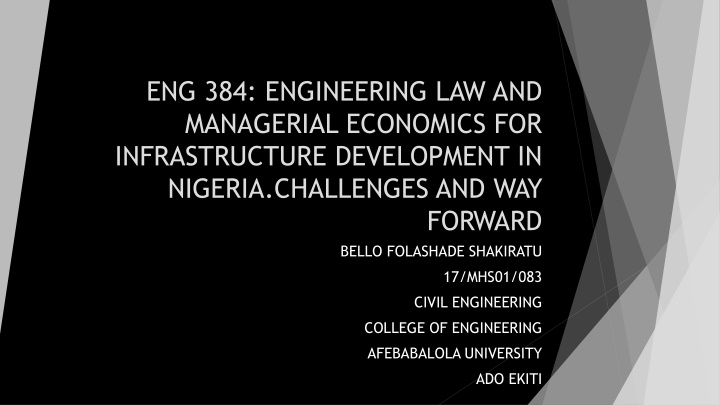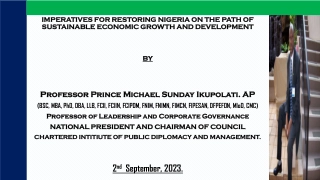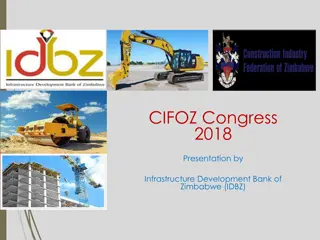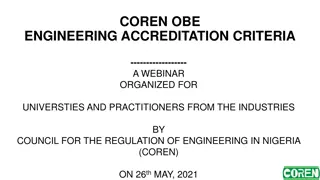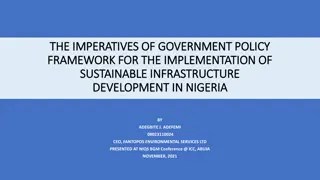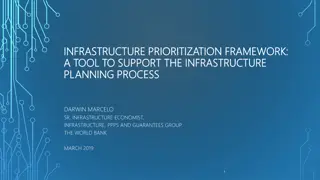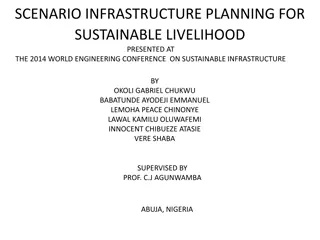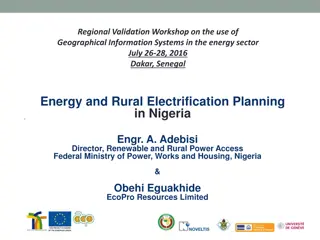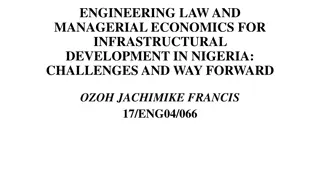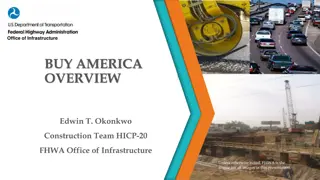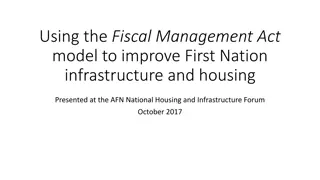Engineering Law for Infrastructure Development in Nigeria - Challenges and Solutions
Infrastructure plays a vital role in economic growth by increasing productivity and enhancing quality of life. Understanding engineering law is essential to ensure public safety in engineering practices. This article delves into the significance of infrastructure and its impact on economic development, particularly in the Nigerian context, highlighting challenges and proposing solutions for sustainable growth.
Download Presentation

Please find below an Image/Link to download the presentation.
The content on the website is provided AS IS for your information and personal use only. It may not be sold, licensed, or shared on other websites without obtaining consent from the author.If you encounter any issues during the download, it is possible that the publisher has removed the file from their server.
You are allowed to download the files provided on this website for personal or commercial use, subject to the condition that they are used lawfully. All files are the property of their respective owners.
The content on the website is provided AS IS for your information and personal use only. It may not be sold, licensed, or shared on other websites without obtaining consent from the author.
E N D
Presentation Transcript
ENG 384: ENGINEERING LAW AND MANAGERIAL ECONOMICS FOR INFRASTRUCTURE DEVELOPMENT IN NIGERIA.CHALLENGES AND WAY FORWARD BELLO FOLASHADE SHAKIRATU 17/MHS01/083 CIVIL ENGINEERING COLLEGE OF ENGINEERING AFEBABALOLA UNIVERSITY ADO EKITI
DEFINITION OF ENGINEERING It can be defined as the scientific understanding of the natural world and using it to invent, design and build things to solve problems and achieve practical goals. This include the development of roads , bridges, cars , planes, machines , tools , processes, and computer. BRANCHES OF ENGINEERING Civil engineering Mechanical engineering Electrical engineering Chemical engineering Mechatronics engineering
DEFINITION OF ENGINEERING LAW Engineering law refers to the application of laws applying to the practice of professional engineering. Engineering law is the study of how ethics and legal frameworks should be adopted to ensure public safety surrounding the practice of engineering
INFRASTRUCTURE A DEFINITION Oyegoke, (2010) refers to Miller (2002) to have defined infrastructure as comprising of capital facilities, transportation, public services and utilities and environmental restoration. Howes and Robinson (2005) cited Jochimesen (1966) as having described infrastructure as the sum of all basic materials, structures, institutional conditions and human resources available to the society, needed for the proper functioning of the economic sector
INFRASTRUCTURE AS A CATALYST FOR ECONOMIC GROWTH
Infrastructure and Economic Development Infrastructure contributes to economic development by increasing productivity and providing amenities which enhance the quality of life. The services generated as a result of an adequate infrastructure base will translate to an increase in aggregate output.
benefits to direct investment - Investment in infrastructure services, such as transportation (roads), electricity and water are intermediate inputs to production. - Infrastructure services tend to raise productivity of other factors. Infrastructure is often termed the unpaid factor of production . Investment in infrastructure in a given location often attracts additional flow of resources.
Infrastructure Procurement Strategies The huge cost associated with infrastructure investment could be overwhelming. To address this, a procurement strategy different from the traditional approach, seems a more optimal route to go. Traditional procurement methods remain the major vehicle for procuring infrastructure projects within Nigerian and Africa in general. However there are risks inherent with them often in the areas of schedule completion delays and cost overruns.
long term strategic impact includes: Poor maintenance cultures of governments preclude efficient and adequate maintenance and operation of infrastructure. Financial risk: Excessive advance payment (mobilization) to contractors places a huge risk on public funds in light of weak public institutional capacity responsible for providing contractual oversight. Short term gains. Traditional approach provides minimal post construction service after the defect liability period (Uff, 2005). Long term revenue generation risks due to undercollection. High amongst inefficient government run infrastructures like the power sector. The result is inadequate funding for operations and maintenance. (V. Foster and C. Briceno-Garmendia, 2010)
PPP procurement strategies PPP procurement strategies could come through bilateral or multilateral funding assistance such as the World Bank, European Commission in collaboration with the private sector. Countries can benefit tremendously through such schemes. In return, the nation will enjoy access to strong infrastructure base, which has a multiplying effect on development and aggregate output. Such as: - Increased agriculture output of farmers through improved roads - creation of a sea ports - Rail links. - Electrical generation, transmission and distribution. - Water and irrigation projects - Increase quality of life of its citizens - Urbanization of different areas.
Risk factors affecting Private investments However, certain reforms have to be in place to attract private investment. External risks appear to be the main risk preventing organizations / financial institutions from investing in long concession contracts in Africa. There are those that are widely known and are listed below: - Political risk - Economic risk - Social risk - Technology risk - Legal risk
Engineering Challenges in Nigeria Corruption Non-Engineers carrying out engineering contracts using engineering credentials Politics Attitude towards maintenance Research and Development
Possible solutions and the way forward Different engineering personnel in various fields should be employed in all engineering departments in both government and private establishments, so that specific jobs can be given to an engineer in his/her chosen area of specialization. That is, there should be division of labor. The pay package of engineers in Nigeria should be commensurate with their counterparts in Europe and America, so that they will not be tempted to eat the capital of any project. Engineers should be discipline and avoid non-engineers using them to achieve their selfish aim they should only tender their certificate when they are involved in a project. And establishments should be mandated by the Nigerian society of engineers, to employ at least one registered engineer. Existing engineering facilities and infrastructures should be upgraded with the present-day state of the art facilities in order to meet up with the present-day demand.
